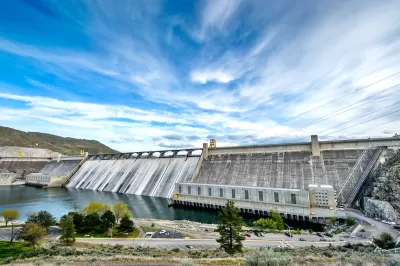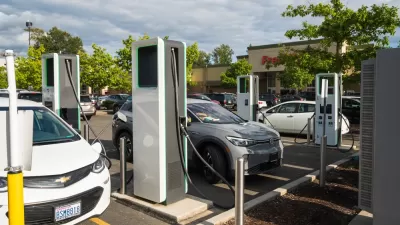New estimates project a steady increase in electricity demand due to population growth, data centers, and the shift to electric power in homes, buildings, and transportation.

Projected electricity demand in the U.S. Northwest will likely grow by 30 percent in the next decade, a growth rate faster than previously expected, writes Alex Baumhardt in Governing.
The increased demand is in part due to the large number of data centers being built in the region as well as greater demand for electric home appliances, buildings, and transportation, according to a report from the Pacific Northwest Utilities Conference Committee. “Oregon’s data center market is the fifth largest in the nation, according to Chicago-based commercial real estate group Cushman & Wakefield. Amazon, Apple, Facebook, Google and X, formerly named Twitter, have massive data centers in eastern Oregon as well as in The Dalles, Hillsboro and Prineville that require enormous amounts of energy to operate.”
Demand for electricity to charge electric vehicles is expected to make up roughly 4 percent of electricity demand in the West by 2034. “Population is also expected to influence demand, with some areas seeing growth and others a drop, and changes in building code laws and energy efficiency mandated by local and state governments will also affect demand, the report said.”
“Members of the utilities committee recommended that regional energy departments collaborate on expanding electrical grids and transmission capabilities across the West to accommodate these changes,” Baumhardt adds.
FULL STORY: Northwest Electricity Demand Projection Triples Previous Estimates

Maui's Vacation Rental Debate Turns Ugly
Verbal attacks, misinformation campaigns and fistfights plague a high-stakes debate to convert thousands of vacation rentals into long-term housing.

Planetizen Federal Action Tracker
A weekly monitor of how Trump’s orders and actions are impacting planners and planning in America.

In Urban Planning, AI Prompting Could be the New Design Thinking
Creativity has long been key to great urban design. What if we see AI as our new creative partner?

Pedestrian Deaths Drop, Remain Twice as High as in 2009
Fatalities declined by 4 percent in 2024, but the U.S. is still nowhere close to ‘Vision Zero.’

King County Supportive Housing Program Offers Hope for Unhoused Residents
The county is taking a ‘Housing First’ approach that prioritizes getting people into housing, then offering wraparound supportive services.

Researchers Use AI to Get Clearer Picture of US Housing
Analysts are using artificial intelligence to supercharge their research by allowing them to comb through data faster. Though these AI tools can be error prone, they save time and housing researchers are optimistic about the future.
Urban Design for Planners 1: Software Tools
This six-course series explores essential urban design concepts using open source software and equips planners with the tools they need to participate fully in the urban design process.
Planning for Universal Design
Learn the tools for implementing Universal Design in planning regulations.
planning NEXT
Appalachian Highlands Housing Partners
Mpact (founded as Rail~Volution)
City of Camden Redevelopment Agency
City of Astoria
City of Portland
City of Laramie





























